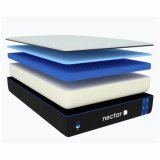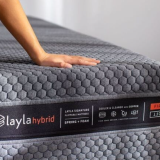For those experiencing chronic pain, finding the best mattress for chronic pain is not just a comfort preference; it’s a necessity for quality sleep and pain relief. Navigating the complex world of mattresses can be daunting, which is why this guide is dedicated to uncovering the ideal mattress for chronic pain sufferers. We explore the intricate link between restful sleep and effective pain management, highlighting how the right mattress choice can transform your nights and alleviate various types of chronic pain.
The Importance of Sleep in Managing Chronic Pain
Sleep and Pain Connection: Sleep is not just a time for rest and relaxation. It’s a crucial period for our bodies to repair and rejuvenate and for our minds to process and consolidate memories. When we don’t get enough quality sleep, it can exacerbate chronic pain by hindering the body’s healing process and increasing inflammation. On the flip side, managing pain effectively can enhance sleep quality, creating a positive cycle of reduced pain and improved rest.
Understanding Chronic Pain Types and Sleep:
Lower Back Pain: Often resulting from poor posture or muscle imbalances, it’s crucial to choose a mattress that supports spinal alignment. Identifying the best bed for chronic pain in the lower back involves seeking a design that maintains spinal neutrality while enhancing comfort and support.
Neck and Shoulder Pain: Often a result of strain or incorrect sleeping postures, finding the best mattress for chronic pain in the neck and shoulder area is key. Opt for mattresses that provide a harmonious balance of support and pressure relief, catering specifically to these sensitive areas.
Hip and joint pain: common in conditions such as arthritis, this type of pain necessitates a mattress offering superior pressure relief. When searching for the best mattresses for chronic pain related to the hips and joints, prioritize those with enhanced cushioning and support features.
The Bidirectional Relationship Between Sleep and Pain
Research has shown that the relationship between sleep and pain is bidirectional, meaning that poor sleep can lead to worse pain, and pain can negatively impact sleep. However, recent studies suggest that sleep impairment is a stronger predictor of pain than pain is of sleep impairment. This means that by improving sleep quality, we can potentially alleviate chronic pain.
The Impact of Chronic Pain on Sleep
Chronic pain can significantly disrupt sleep. People living with chronic pain commonly experience waking several times each night and long-term reduced sleep quality. This sleep disruption can be characterized by longer sleep onset, more frequent and longer awakenings after sleep onset, shorter total sleep time, lower sleep efficiency, and poorer sleep quality.
The Role of Sleep in Pain Management
Sleep plays a crucial role in managing chronic pain. Sleep deprivation can increase pain stimulus responses, making the pain feel more intense. On the other hand, good quality sleep supports physical recovery, memory consolidation, learning, and positive mood, which can all contribute to pain management.
Interventions to Improve Sleep and Manage Pain
There are various interventions available to improve sleep and manage pain. While pharmacotherapy treatments may offer short-term solutions, they may have unwelcome side effects and are not recommended for long-term use. Non-pharmacological interventions, such as relaxation, mindfulness, physical therapies, and exercise, have gained traction in recent years as ways to improve sleep without side effects and provide long-term support. Cognitive behavioral therapy (CBT) approaches, including CBT for insomnia (CBT-i), CBT for pain (CBT-P), and combined approaches (CBT-iP), have provided the largest evidence base.
Key Considerations in Mattress Selection for Chronic Pain
Firmness Level: The ideal firmness level varies based on sleeping position and body type. Side sleepers generally benefit from softer mattresses, while back or stomach sleepers may prefer firmer options. Adjustable firmness can be a versatile choice.
Support vs. Pressure Relief: Seek a mattress that aligns the spine and cushions sensitive areas. A balance between these features is essential.
Material Options:
- Memory Foam: Offers contouring and pressure relief.
- Latex: Known for support and hypoallergenic properties.
- Hybrid: Combines spring support with foam or latex comfort layers.
Motion Isolation: Crucial for undisturbed sleep, especially for those sharing a bed.
Sleeping Positions and Mattress Selection
Different sleeping positions can affect the ideal mattress firmness and support:
- Side Sleepers: A medium-soft to medium-firm mattress provides pressure relief and contouring for the body’s curves, reducing stress on the hips and shoulders.
- Back Sleepers: A medium-firm to firm mattress offers adequate support for the spine, preventing lower back pain.
- Stomach Sleepers: A firmer mattress helps maintain proper spinal alignment and prevents the back from arching.
Mattress Materials and Chronic Pain
Different mattress materials can impact pressure relief and support for those with chronic pain:
- Memory Foam: contours the body, providing pressure relief and reducing stress on pressure points.
- Latex: Offers a balance of support and pressure relief, with a more responsive feel than memory foam.
- Hybrid: Combines the support of innerspring coils with the contouring comfort of memory foam or latex layers, providing a balance of support and pressure relief.
Additional Factors to Consider
- Body Weight: Heavier individuals may require a firmer mattress for adequate support, while lighter individuals may prefer a softer mattress for pressure relief.
- Temperature Regulation: Some materials, like memory foam, can retain heat, so consider a mattress with cooling properties if you tend to sleep hot.
- Adjustable Firmness: An adjustable firmness mattress allows you to customize the feel to your preference, accommodating changes in sleeping position or body weight.
Selecting the right mattress for chronic pain involves considering your sleeping position, body weight, and personal preferences. Opt for a mattress that provides a balance of support and pressure relief, and consider the material options to find the best fit for your needs.
Top Mattress Recommendations for Chronic Pain

Here are some top mattress recommendations for chronic pain, considering factors such as firmness level, support, pressure relief, and material options:
- Memory Foam Mattress
- Pros: Exceptional pressure relief, good motion isolation, suits various sleep positions.
- Cons: Potential heat retention, may lack support for stomach sleepers.
- Hybrid Mattress
- Pros: Balanced support and comfort, responsive, versatile for different sleep positions.
- Cons: Higher cost, may offer less motion isolation than all-foam options.
- Latex Mattress
- Pros: Durable, naturally hypoallergenic, breathable.
- Cons: Higher cost, may not contour as closely as memory foam.
When selecting a mattress for chronic pain, consider factors such as your sleeping position, body weight, and personal preferences. Opt for a mattress that provides a balance of support and pressure relief, and consider the material options to find the best fit for your needs.
Conclusion and Tips for Chronic Pain Sufferers
Choosing the right mattress involves considering firmness, material, and cooling properties. It’s often a process of trial and error to find the perfect fit. Remember, investing in a quality mattress is investing in your health and well-being.
FAQs
Q: How can I tell if my mattress is contributing to my chronic pain?
A: If you often wake up in pain or feel it worsen at night, your mattress might be a factor. Experiment with different mattresses or a topper to see if your pain improves.
Q: When should I replace my mattress?
A: Typically, every 7-10 years. However, if your mattress no longer provides necessary support and comfort, consider an earlier replacement.
Q: Can a mattress topper aid in relieving chronic pain?
A: Yes, a topper can add comfort or support to your mattress. Select a material like memory foam or latex for optimal benefits.











